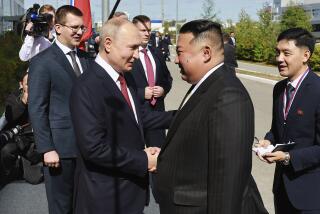Less Equals More at Superpower Summit : Leaders agree Saddam must back down--that’s something
- Share via
There was something comforting about the casual way Sunday’s summit on the Persian Gulf crisis ended without bombast or bombshells.
President Bush and Soviet President Mikhail S. Gorbachev made it clear in Helsinki that they still want Iraq’s Saddam Hussein and his troops out of Kuwait immediately, or else.
For different reasons, neither would talk about what “or else” means, deferring to the communique’s point that if the embargo fails to bring Hussein to his senses, “ . . . we are prepared to consider additional (measures) consistent with the United Nations Charter.”
Still, the very absence of surprise is a sure sign that the trip to Helsinki was a step forward for both. Their eight hours of conversation did not produce a new world order to replace the order of the Cold War--now fast fading--as some had predicted. It did not make the gulf crisis go away.
But the strong language in which both condemned Iraq and emphasized that nothing less than Hussein’s forces pulling out of battered Kuwait would be acceptable makes it hard to see the result as a “substantial setback,” as one analyst called it.
As Gorbachev said, what the meeting was about was another “test of the durability” of the new relationship between the United States and the Soviet Union to solve crises peaceably. It was a test of the process of diplomacy under entirely new management and with new rules that will take some time getting used to.
As Bush noted, the changes in superpower attitudes that began at Malta and continued through Camp David and Helsinki have produced mutual understanding that would have been out of the question a few years ago.
In fact, the mugging and horseplay at their Helsinki press conference when Gorbachev said he was about to spill a secret without consulting Bush would have been unthinkable even months ago. It was not really a secret, anyway: Washington no longer denies, as it did for years, a legitimate Soviet role in the Middle East.
For Saddam Hussein, facing a tightening embargo on exports of oil for the dollars that his economy desperately needs and of imports of food and other goods that his people need, the summit could not be comforting. With troops from the United States and Arab League pouring into the gulf area, he has spent more than five weeks in the position of a gangster who has tripped an alarm while robbing a bank. Now he hears a police SWAT team outside warning him that they’re in for the long haul.
Surely it would be hard to find a citation to document Gorbachev’s post-summit statement that there is a “solidarity” of world opinion on the Iraqi invasion of Kuwait “which has never been expressed before in the history of the world.” But the fact that he sees the situation in those terms is as important as whether or not it is true.
The summit’s success in binding the superpowers together on the crisis will not make it any easier on either. The Soviet economy continues to sag sharply and, until the embargo, Iraq was a prime source of hard currency for the Soviet Union. The earnings on Iraqi oil were swapped for Soviet arms and expertise in oil field development. Moscow also could have used payments on $10 billion that Baghdad owes the Soviets for arms purchased during its war with Iran.
With the United States already teetering on the brink of recession, the steep rise in oil prices that followed the gulf crisis will drain another $5 billion a month from the economy, a gloomy prospect.
The Helsinki summit’s contribution to getting Saddam Hussein to back down may be less than what Washington and its allies could have asked. But it is more than they would have gotten a year ago, and that--in the real world--is what counts.
More to Read
Sign up for Essential California
The most important California stories and recommendations in your inbox every morning.
You may occasionally receive promotional content from the Los Angeles Times.













